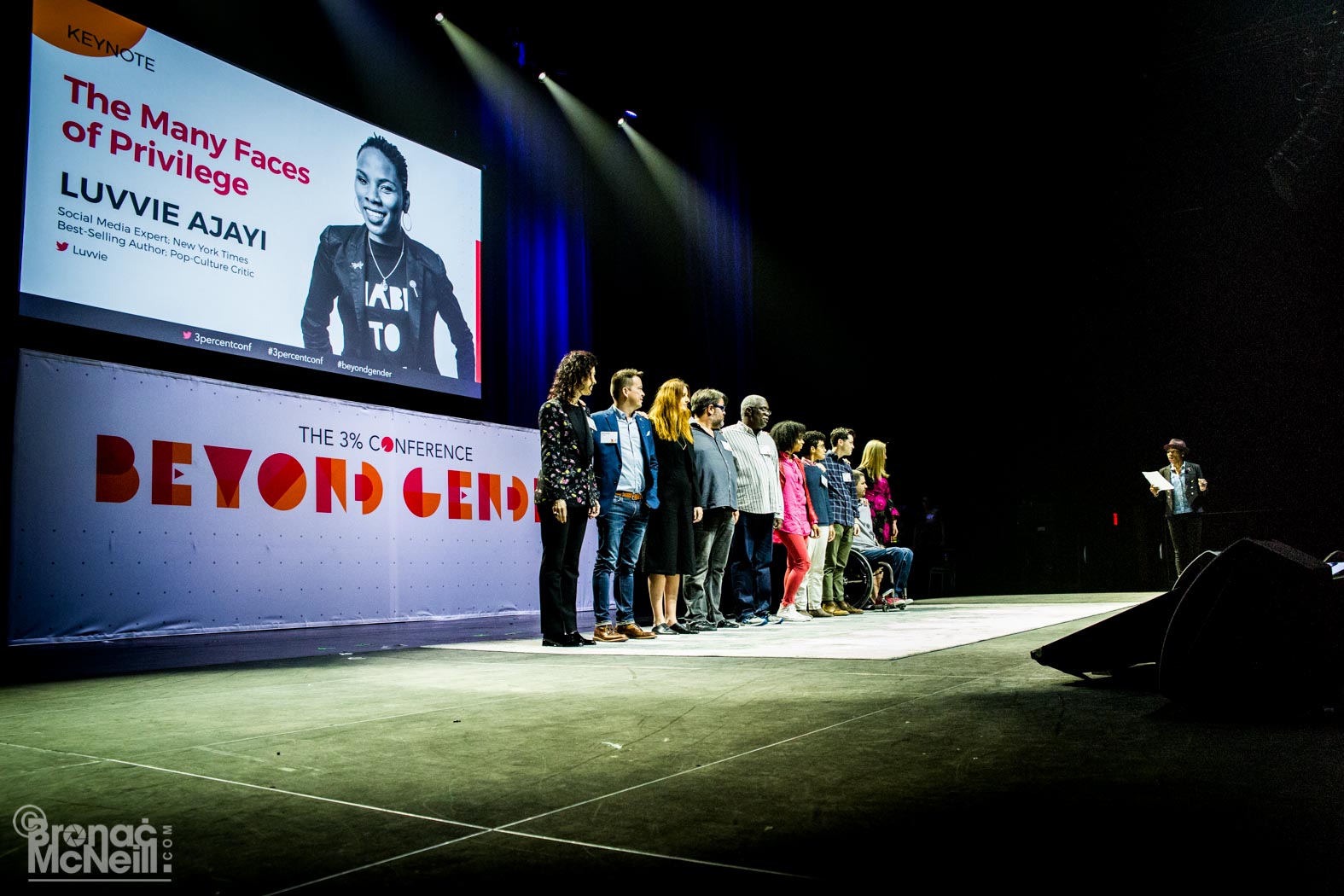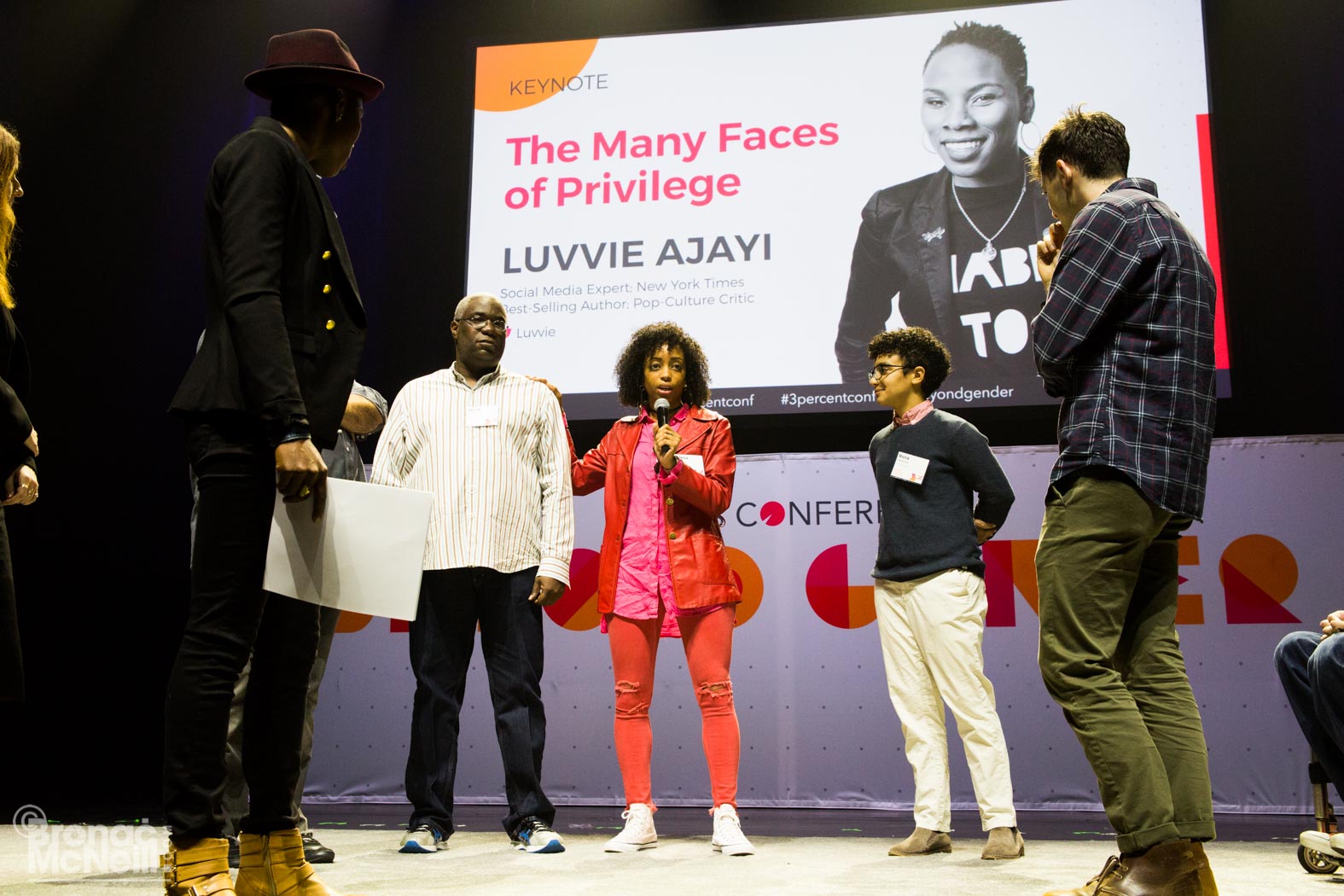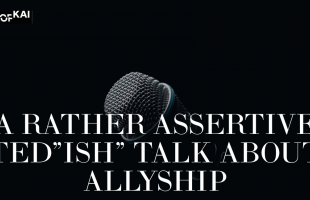
Keynote: The Many Faces of Privilege
Christina Melander likes asking questions and making great stories and strategies with the answers. Having worked for brands, agencies, and publications, her career spans journalism, content strategy, and communications. She is a mother, wife, friend, daughter, writer, and feminist who currently leads communications for Swift agency and is a Portland ambassador for Ladies Get Paid. Find her out for a run, on the soccer sidelines, or watching Riverdale.
Luvvie Ajayi—award-winning writer and digital strategist—kicked off our BEYOND GENDER theme by considering one of the most misunderstood words today: “privilege.” Defining it fully can be a defining moment.
Fresh from speaking at TED Women in New Orleans the night before, Luvvie Ajayi bounded onto the stage to emcee and lead the first session of the conference. Pop-culture critic and self-described professional troublemaker, she studied psychology in college driven by a desire to “figure out our lives.”
She was struck by an exercise conducted in class that recalibrated the way she perceived privilege: her own and others’. “We all have privilege but we may give ourselves more credit or not enough credit for what we have until you see it in motion.”
Welcome to the Privilege Walk.

Ten pre-selected attendees appeared on stage and fanned out in a row facing the audience. They represented diversity in all the facets this 3% Conference sought to amplify: gender, race, ethnicity, physical ability, sexual orientation, and age. Luvvie asked them to place their right hand on the shoulder of the person next to them. Next, she took them (and all of us) through a series of questions, instructing them to take a step forward, backward, or not at all with each answer.
- Take a step forward if you are right-handed.
- Take a step forward if English is your first language.
- Go forward if one or both of your parents have a college degree.
- Move forward if you can walk into a drugstore and easily find Band-Aids that match your skin tone.
- Step forward if you studied the culture of your ancestors in grade school.
- Take a step backward if you’ve ever been made fun of or bullied for something beyond your control.
- Move forward if you can assume physical access to most buildings.
- Step back if anyone in your family left their homeland, not of their free will.
- Step forward if you can see yourself readily represented in mainstream media.
- Move back if you think twice about calling the cops when trouble happens.
- Move back if you’ve ever skipped a meal or gone hungry because you didn’t have enough money.
- Step back if you suffer from a physical illness.
- Step back if you suffer from an invisible illness.
- Take a step back if you go by a different name in public because people can’t pronounce your given name.
- Take a step forward if you always assumed you’d go to college.
- Step forward if your religious community wouldn’t exclude you for your sexuality.
- Step forward if your religious community wouldn’t exclude you because of your race or ethnicity.
- Move forward if you have at least one stamp in your passport.
“Now look around and see if your hands are still on each other’s shoulders,” Ajayi prompted. “I’m Nigerian and I assumed I’d end up at the back when I did this in college. But I was in the middle and one of my white classmates was behind me,” she continued. “Is anyone surprised by where they ended up?”
A woman toward the back spoke first: “As a queer biracial woman, I’m not surprised, but it’s nice to see others around me.”
Next, a white woman at the front said: “As you break apart from one another, I was struck that I literally couldn’t see the people behind me. I didn’t know how far back they were. They were just gone from view.”

“In the back, you see people’s backs and they’re not looking at you,” responded an older black man from the rear of the stage.
“In Brazil, I’d be at the front of the line,” said a middle-aged man in the middle.
Few participants were left physically linked, forced to separate as they responded to the questions, and many of them said this was the most jarring aspect of the exercise: to break apart without choice. “In real life, you don’t feel that break,” Ajayi noted.
That is what the Privilege Walk makes so plain. The people all around us—the ones we build and create with, pass on the street, order a meal from, listen to at a conference, work with for 8 to 10 hours a day—all carry stories that are visible and invisible, known and unknown, vital to who we are and what we can teach one another.
“This is about being aware of what you have and what others may or may not have and being sensitive to it,” Ajayi said.
Next, she asked: What questions made you pause?

“The invisible disability.”
“Parents not having gone to college. I hadn’t thought of that before.”
Ajayi continued: “I could have asked how many people have 50 or more books in their homes. Because some very smart people end up in places you wouldn’t expect.”
She noted that the exercise is time-sensitive and can indicate how society is making progress. For example, being asked if you can marry the person you love yields a different answer now than in 2014.
The session was almost over before a white man standing at the very front of the line spoke. “In an ideal world, we would all be here. I just want to learn how we can pull everyone else up.”
Professionally, how seems to lie not just in hiring people across the spectrum of race, ethnicity, sexual identity, gender, nationality, age, and physical ability, but in creating an environment where everyone is empowered to speak without fear of consequences. Without worrying about seeming other, uptight, or whether we’ll be invited out for the next round of drinks. The how exists in breaking down the big, broad word DIVERSITY and recognizing that we are not one big group that moves together. We don’t.
And maybe the goal isn’t for everyone to be on the same line, devoid of differences. I think the goal is for everyone to have a fair shot at realizing their ambitions; for differences to be seen as strengths, not setbacks. For privilege not be privileged.




